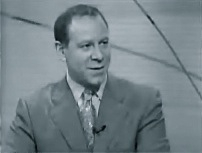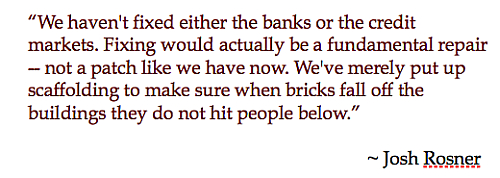This is a guest contribution by Damien Hoffman, editor-in-chief of the very popular Wall St Cheat Sheet blog. Make sure to put this site on your must-read list.

Josh Rosner is the inaugural recipient of our first annual Medal of Honor for Excellent Service Award. Like a Navy Seal who does the most elite work yet receives the least public spotlight, Rosner has for years consistently been one of the best analysts on Wall Street. Most importantly, while other false prophets had undeservedly taken credit for nailing the crisis (for the wrong reasons), Rosner and a small handful of other hard working analysts saw and called everything for the right reasons in real-time.
For this reason, Rosner deserves to be treated like a Rock Star. If you had invested money based on Rosner’s calls, you’d surely feel like one. So, while the circus freaks and high-powered public relations people garner all the attention, Wall St. Cheat Sheet is going to bring you the gentlemen who invaded enemy territory in the dark of night and emerged with the Truth.
I had the great honor of sitting down with Josh to discuss his career, the bias of traditional Wall Street analysts, the current state of the financial system, Goldman Sachs et al, the lost spirit of capitalism, and the good guys on Wall Street …

Damien Hoffman: Josh, tell me how your career on Wall Street started.
Josh: Totally circumstance. To make a long story very short, I started on Wall Street in the depths of the ‘89-’90 recession. I couldn’t find a job except on Wall Street. I came from a legal family. Wall Street was the last industry I ever intended or thought I’d work in. I thought I was going to go into foreign service. I expected to work for or hoped to work in the government - ideally, in foreign service or international affairs.
Damien: So you thought you’d travel the world and now you’re stuck on a 9-mile long island?
Josh: I didn’t want to travel the world as much as I wanted to be a productive part of policy formation.
Damien: How did you stumble upon your first job Wall Street job?
Josh: A friend made a suggestion to talk with her brother who then was at Lehman Brothers. I interviewed there and they hired me as an associate. That was it!
Damien: Since then you’ve worked your way towards becoming an independent analyst. Can you tell us about that journey?
Josh: I was at Lehman for about 3 years. Then I left and went to Oppenheimer - which was bought by CIBC. I was there for almost a decade. The second half of it was focused almost entirely on financial service industry research. I got tired of the quality of research I was watching come out of the sell-side and the increase in conflicts of interest that were becoming more apparent in the dot-com period.
I think all of us are born either growth or value guys. I was born a value guy. So, the dot-com thing never made much sense to me. Some like-minded colleagues, both buy-side and sell-side, and I left to start an independent research firm. We did that until shortly after 9/11 when circumstance changed.
At that point, we offered KBW our research product until they got back on their feet after 9/11. Keefe’s response was, “We really appreciate it, but we can’t source from somewhere else. Why don’t you folks all you come over?” They wanted me to follow New York or New England thrifts and GSEs. I wasn’t very comfortable going back to the traditional sales side. My partners and I had differing views. We still remain very good friends. I simply wanted to keep going down the path of an independent financial research boutique. They did too, but they thought there was an opportunity to do that within Keefe. So, we went different ways.
It became very difficult for me to do it by myself and I was hired away to a firm called Medley Global Advisors. They asked me to run their financial services practice and focus on advising institutional investors on regulatory, legislative, and policy issues.
I was there from the beginning of 2003 through the middle of 2006. Management started heading down a different path than I. So, I continued to do my thing at Graham-Fisher. That brings us to today.
Damien: What exactly has you diverging toward the independent analyst route?
Josh: One is the most obvious potential conflicts of interest between investment banking clients and research - right where perhaps analysts puts a more favorable spin on the securities of companies they’ve got a banking relationship with. Furthermore, the willingness to be pressured by large institutional clients who want you to consider stocks or securities that they’ve got heavy exposure to.
It seems to me that the independence of your view is really paramount. In the largest and most complex financial institutions, the institutions themselves do not offer levels of disclosure and transparency that make them truly analyzable.
Damien: Is it hard to get access because you don’t play the game?
Josh: I have to rely solely on the cold hard facts of their filings and public disclosures coupled with my macro-economic analysis. Wall Street is so siloed it becomes hard for an analyst at a traditional Wall Street firm to actually have an economic outlook. The guy who’s covering the mortgage bankers is not covering the mortgage insurers. The guy who’s covering the mortgage insurers is not covering the GSEs. The guy who’s covering the GSEs is not covering the thrifts. However, changes within a sector occur where all of these sub-sectors meet. So, the traditional sell-side analyst is stuck relying much more heavily on management to give them macro guidance and highlight structural changes in the industry. Consequently, their independence ends up jeopardized.
Damien: Speaking of macro views, we all know one of the prongs for a sustained recovery is fixing the banking system. Can you update us on which inning we’re in and what you think the banks have done well so well so far?
Josh: In terms of fixing the banking system, there’s a couple ways of answering the question. That question also needs to be asked as the banking system distinct from the real economy, and the banking system distinct from the credit markets. There are really three different things related to each other with interplay, but they’re separate.
Damien: I was thinking specifically about the banks because they went through the process of giving out loans to people who couldn’t pay them back and it’s been the heart of the problem. But when you delineate it that way, the credit markets have also been in disarray and need to be healed as well.
Josh: Our large banks have taken some level of government support. They’ve raised some level of capital. I think it has bought them time. I don’t think they fundamentally dealt with a lot of the troubled assets they continue to hold. That’ll have to be dealt with. We still have a significant number of smaller banks that are going to fail. Depending on how you define ‘fail’, we probably have north of 600 and potentially as high as 1100 failed banks. More realistically, I think 600-800 banks are going to fail. But let’s not look at the issue in terms of banks. We should look at it in terms of assets.
Part of the problem is the banks are still by and large undercapitalized to perform the financial intermediation that bankers are expected to perform. In 1989, banks and savings institutions were responsible for providing 65% of consumer revolving credit. Since 2000, they’ve only been responsible for 30-40% of that consumer revolving credit. However, securitized pools as a percentage of total revolving consumer credit were 6% in 1989. Since 2000, they’ve been somewhere close to 50% - declining only since the beginning of the crisis.
Click here for the full interview.
Source: Damien Hoffman, Wall St. Cheat Sheet, September 22, 2009.











